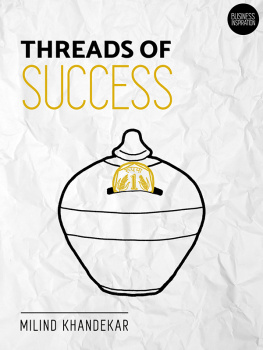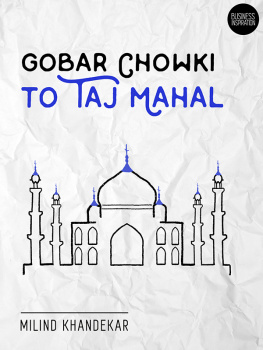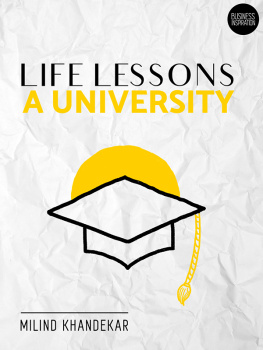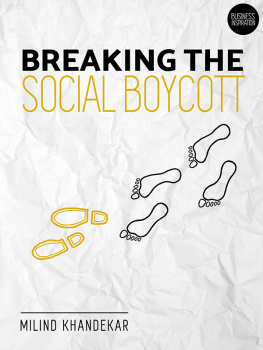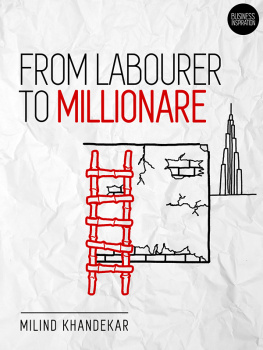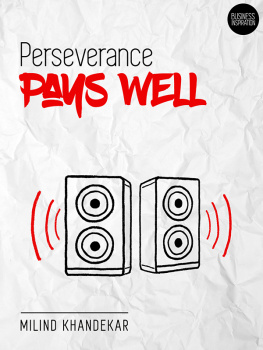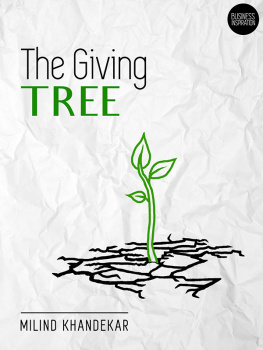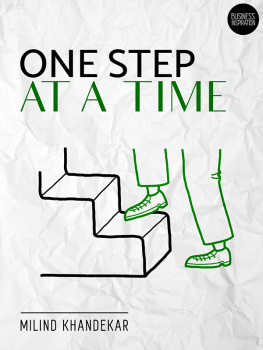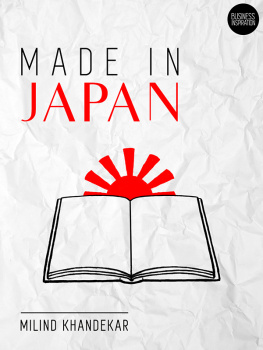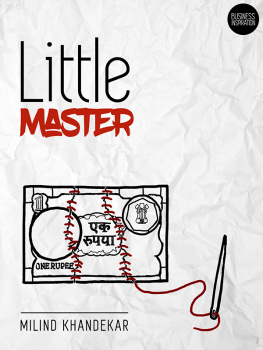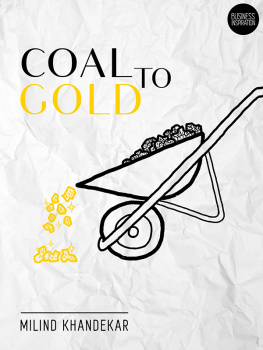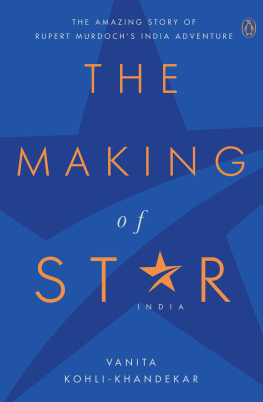Khandekar - THREADS OF SUCCESS
Here you can read online Khandekar - THREADS OF SUCCESS full text of the book (entire story) in english for free. Download pdf and epub, get meaning, cover and reviews about this ebook. year: 2017, publisher: Penguin Books Ltd, genre: Home and family. Description of the work, (preface) as well as reviews are available. Best literature library LitArk.com created for fans of good reading and offers a wide selection of genres:
Romance novel
Science fiction
Adventure
Detective
Science
History
Home and family
Prose
Art
Politics
Computer
Non-fiction
Religion
Business
Children
Humor
Choose a favorite category and find really read worthwhile books. Enjoy immersion in the world of imagination, feel the emotions of the characters or learn something new for yourself, make an fascinating discovery.
- Book:THREADS OF SUCCESS
- Author:
- Publisher:Penguin Books Ltd
- Genre:
- Year:2017
- Rating:3 / 5
- Favourites:Add to favourites
- Your mark:
- 60
- 1
- 2
- 3
- 4
- 5
THREADS OF SUCCESS: summary, description and annotation
We offer to read an annotation, description, summary or preface (depends on what the author of the book "THREADS OF SUCCESS" wrote himself). If you haven't found the necessary information about the book — write in the comments, we will try to find it.
THREADS OF SUCCESS — read online for free the complete book (whole text) full work
Below is the text of the book, divided by pages. System saving the place of the last page read, allows you to conveniently read the book "THREADS OF SUCCESS" online for free, without having to search again every time where you left off. Put a bookmark, and you can go to the page where you finished reading at any time.
Font size:
Interval:
Bookmark:





UK | Canada | Ireland | Australia
New Zealand | India | South Africa
Penguin Books is part of the Penguin Random House group of companies whose addresses can be found at global.penguinrandomhouse.com.

Copyright Milind Khandekar 2013
The moral right of the author has been asserted
This digital edition published in 2016.
e-ISBN: 978-9-386-65178-5
This book is sold subject to the condition that it shall not, by way of trade or otherwise, be lent, resold, hired out, or otherwise circulated without the publishers prior consent in any form of binding or cover other than that in which it is published and without a similar condition including this condition being imposed on the subsequent purchaser.


Let the conversation begin...
Follow the Penguin Twitter.com@PenguinIndia
Keep up-to-date with all our stories YouTube.com/PenguinIndia
Like Penguin Books on Facebook.com/PenguinIndia
Find out more about the author and
discover more stories like this at penguinbooksindia.com
PENGUIN
Milind Khandekar has over twenty-two years of experience in the field of journalism. He is currently managing editor at Media Content and Communications Services (I) Pvt. Ltd (MCCS), and looks after the editorial content of ABP News, ABP Ananda and ABP Majha. He has previously worked with the Navbharat Times and Aaj Tak. He is a product of the Times Centre for Media Studies, and received the Rajendra Mathur Award for best trainee (Hindi) in 1991.

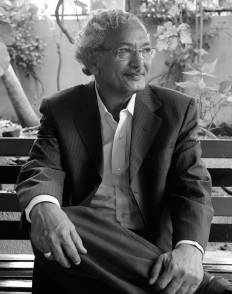
DEVJIBHAI PREMJIBHAI MAKWANA HAS lived in a three-storeyed building in Sardar Patel Society, Bhavnagar, Gujarat, with his four sons and their families for the last twelve years. Bhavnagar has a population of approximately 12 lakh people; a lot of the rich people of the city live in this colony. Every house has a couple of cars parked outside itDevjibhais house has ten. Each of his four sons runs different factories and two of his daughters-in-law take care of the office-related work.
Devjibhai wanted to buy another plot in light of the familys increasing space requirement, but wasnt able to due to caste discrimination. He had identified a plot, but the seller refused to liaison with Devjibhai because he was a Patel and Devjibhai was Dalit15 per cent of the residents in the housing society are Patels. Traditionally, Patels have been proud landlords and pramukhs (village heads), but they cannot be vocal about their prejudices against Dalits as discrimination is a punishable offence under the law and can result in imprisonment for the accused. Instead, they have found subtle ways to perpetuate their preconceived notions, usually by making excuses to not deal with Dalits. Fed up of playing cat and mouse, Devjibhai decided to build a house in another part of the city.
According to Devjibhai, the only reason he was able to buy the house in Sardar Patel Society at all was due to the fact that the builder was his friend and was in need of money at the time. Otherwise, despite earning crores of rupees, the Makwana family could not even have owned a house of their choice. Before moving to the society, they lived in Kumhar Vada in their ancestral homethe Dalit neighbourhood where Devjibhai started his career. Today, though his business has grown by leaps and bounds, Devjibhai truly appreciates the value of money. He knows he is allowed to live where he does because he has money. Without it, he would not be accepted into society.
Despite facing discrimination, Devjibhai has succeeded in setting up an empire valued at Rs 300 crore. He manufactures filament yarn, plastic ropes, fishing nets, PVC straps, crimp yarn, etc. All these products are made from petrochemicals and are used in manufacturing mats, thread for stitching bags, industrial packing, socks and undergarments. Devjibhai has four companies: Suraj Filaments Private Limited, Veera Synthetic Private Limited, Shiv Synthetic, and Straps India Private Limited, with factories just outside of Bhavnagar.
While visiting the factories along with Devjibhai, I noticed that none of them were on the main road; there was no signage giving directions nor was there a board displaying names or any other information. Even though every company wants to highlight its name in todays brand-conscious world, Devjibhai doesnt believe in doing so. This is not because he manufactures industrial products that are not sold directly to the customer, but because he feels that being on the main road attracts unnecessary attention and may lead to interference from government officials. His insecurity seems to stem from the fact that he is a Dalithe avoided elaborating on his apprehensions further.
The Makwana family has been in business for three generations nowever since Devjibhais grandfather came to Bhavnagar from Ranpur and the family started working on leather pickers. Pickers are used for weaving cloth and picking thread on both sides of the loom. Devjibhais father and his brothers set up Bhavnagar Pickers Limited, which was later divided amongst them. Devjibhais father, Premjibhai, started his own business, Bhagyoday Pickers Works, and the father of Ratilal Makwana (whom we meet in Chapter 3), Galabhai, started Gujarat Pickers Industries Limited. Gujarat Pickers is still active, but instead of making pickers, the company now trades in petrochemicals. It sells raw materials like high-density polypropylene (HDPE) and low-density polypropylene (LDPE), whereas Devjibhai uses this raw material to manufacture all kinds of plastic products. The two cousins have nothing to do with each others businesses.
Devjibhai has studied only up to class ten. He discontinued school in 1972 not because of poor circumstances, but because he wanted to start working right away. He was the second of five brothers; his older brother had been making wooden bobbins, used for manufacturing fabric, at the time, while his other brothers had continued studying. Devjibhai says he preferred to work rather than study. Later, working became a necessity.
In 1974, his father passed away at the age of fifty, leaving the entire responsibility for the business with the five brothers. However, as the emergence of plastic pickers resulted in the leather picker business going through a slump, the brothers got together to start manufacturing plastic ropes. This company, Suresh Industries, made ropes out of petrochemicals. There was no particular reason for choosing this business except for the fact that Bhavnagar has a large number of these factories, being the largest hub for manufacturing of plastic ropes in the country. All five brothers worked together, and for the next fifteen years the business did well and achieved a turnover of Rs 45 crore.
Font size:
Interval:
Bookmark:
Similar books «THREADS OF SUCCESS»
Look at similar books to THREADS OF SUCCESS. We have selected literature similar in name and meaning in the hope of providing readers with more options to find new, interesting, not yet read works.
Discussion, reviews of the book THREADS OF SUCCESS and just readers' own opinions. Leave your comments, write what you think about the work, its meaning or the main characters. Specify what exactly you liked and what you didn't like, and why you think so.

